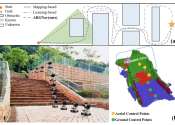Model simulates variable flap stiffness in a wing for the best lift
There is extensive research on how a fixed-position flap affects lift in the realm of fluid-structure interaction. However, taking the conversation in a new direction, researchers at the University of Illinois Urbana-Champaign ...
Apr 6, 2023
0
181









